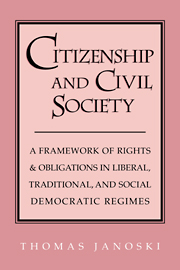 Citizenship and Civil Society
Citizenship and Civil Society Book contents
- Frontmatter
- Contents
- List of Figures and Tables
- Acknowledgments
- 1 Introduction to Citizenship
- 2 The Framing of Citizenship Rights: Expansion, Clarification, and Meaning
- 3 Reconstructing Obligations and Patriotism: Limitations, Sanctions, and Exchange in a System of Rights
- 4 Citizen-Selves in Restricted and Generalized Exchange
- 5 The Balance of Rights and Obligations through Nesting, Civil Society, and Social Closure
- 6 Incremental Change in Citizenship over Decades: Power Resources, State Structures, Ideology, and External Forces
- 7 Momentous Change in Citizenship over Centuries: From Wasps to Locomotives in the Development and Sequencing of Rights
- 8 Conclusion and Implications
- Notes
- References
- Subject Index
- Name Index
5 - The Balance of Rights and Obligations through Nesting, Civil Society, and Social Closure
Published online by Cambridge University Press: 05 June 2012
- Frontmatter
- Contents
- List of Figures and Tables
- Acknowledgments
- 1 Introduction to Citizenship
- 2 The Framing of Citizenship Rights: Expansion, Clarification, and Meaning
- 3 Reconstructing Obligations and Patriotism: Limitations, Sanctions, and Exchange in a System of Rights
- 4 Citizen-Selves in Restricted and Generalized Exchange
- 5 The Balance of Rights and Obligations through Nesting, Civil Society, and Social Closure
- 6 Incremental Change in Citizenship over Decades: Power Resources, State Structures, Ideology, and External Forces
- 7 Momentous Change in Citizenship over Centuries: From Wasps to Locomotives in the Development and Sequencing of Rights
- 8 Conclusion and Implications
- Notes
- References
- Subject Index
- Name Index
Summary
If citizenship means anything, it means a package of benefits and burdens shared, and accepted, by all.
William Galston (1991, p. 250)There are various ways in which it is possible for a closed social relationship to guarantee its monopolized advantages to the parties, (a) Such advantages may be left free to competitive struggle within the group; (b) they may be regulated or rationed in amount and kind; or (c) they may be appropriated by individuals or sub-groups on a permanent basis and become more or less inalienable. The last is a case of closure within, as well as against outsiders. Appropriated advantages will be called “rights.”
Max Weber (1978, p. 43)Given that varying levels of citizenship exist, how do societies and their constituent groups and categories organize rights and obligations in their relationships to the state? The explanations proposed here will differentiate between liberal, traditional, and social democratic regimes in how they operationalize restricted and generalized exchange. This is in part because much of the citizenship literature seems to pinpoint self-oriented versus other- or community-oriented behavior in the construction of civil society and effective state mechanisms (Dahrendorf 1974; Janoski and Wilson 1995). This chapter will first explore the macro-relationship of rights and obligations in a double-relationship of capitalism and state redistribution. It then discusses liberalism, traditionalism, and social democracy as defining basic regimes of generalized and restricted exchange that demonstrate the principles involved with voluntary associations in civil societies.
- Type
- Chapter
- Information
- Citizenship and Civil SocietyA Framework of Rights and Obligations in Liberal, Traditional, and Social Democratic Regimes, pp. 104 - 141Publisher: Cambridge University PressPrint publication year: 1998


